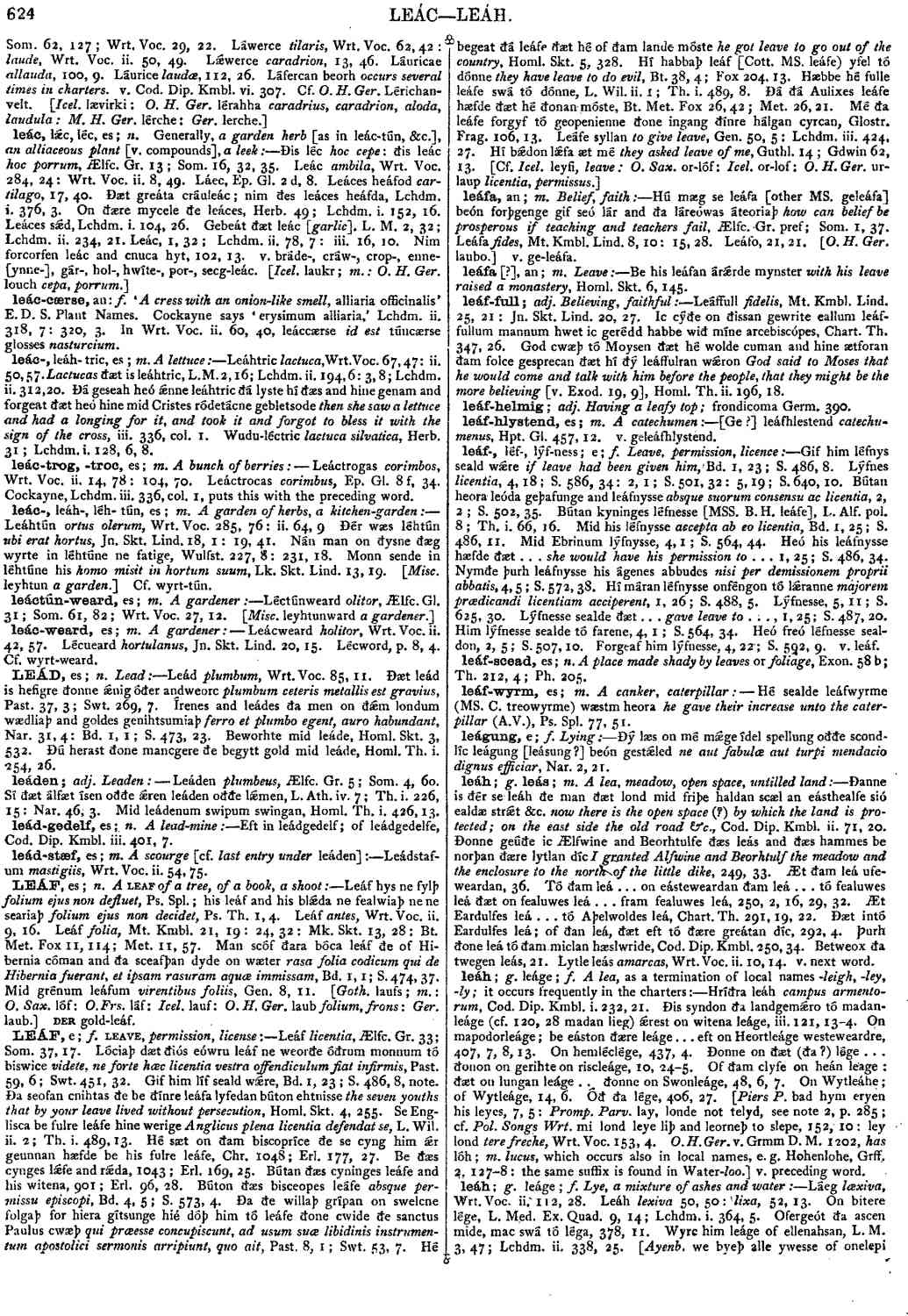LEÁF
- noun [ feminine ]
-
Leáf
licentia,
- Ælfc. Gr. 33 ;
- Som. 37, 17 .
-
Lóciaþ ðæt ðiós eówru leáf ne weorðe óðrum monnum tó biswice
videte, ne forte hæc licentia vestra offendiculum fiat infirmis,
- Past. 59, 6 ;
- Swt. 451, 32 .
-
Gif him líf seald wǽre,
- Bd. 1, 23 ;
- S. 486, 8, note .
-
Ða seofan cnihtas ðe be ðínre leáfa lyfedan búton ehtnisse
the seven youths that by your leave lived without persecution,
- Homl. Skt. 4, 255 .
-
Se Englisca be fulre leáfe hine werige
Anglicus plena licentia defendat se,
- L. Wil. ii. 2 ;
- Th. i. 489, 13 .
-
Hé sæt on ðam biscopríce ðe se cyng him ǽr geunnan hæfde be his fulre leáfe,
- Chr. 1048 ;
- Erl. 177, 27 .
-
Be ðæs cynges lǽfe and rǽda,
- 1043 ;
- Erl. 169, 25 .
-
Bútan ðæs cyninges leáfe and his witena,
- 901 ;
- Erl. 96, 28 .
-
Búton ðæs bisceopes leáfe
absque perrnissu episcopi,
- Bd. 4, 5 ;
- S. 573, 4 .
-
Ða ðe willaþ grípan on swelcne folgaþ for hiera gítsunge hié dóþ him tó leáfe ðone cwide ðe sanctus Paulus cwæþ
qui præesse concupiscunt, ad usum suæ libidinis instrumentum apostolici sermonis arripiunt, quo ait,
- Past. 8, 1 ;
- Swt. 53, 7 .
-
Hé begeat ðá leáfe ðæt hé of ðam lande móste
he got leave to go out of the country,
- Homl. Skt. 5, 328 .
-
Hí habbaþ leáf [Cott. MS. leáfe) yfel tó dónne
they have leave to do evil,
- Bt. 38, 4 ;
- Fox 204, 13 .
-
Hæbbe hé fulle leáfe swá tó dónne,
- L. Wil. ii. 1 ;
- Th. i. 489, 8 .
-
Ðá ðá Aulixes leáfe hæfde ðæt hé ðonan móste,
- Bt. Met. Fox 26, 42 ;
- Met. 26, 21 .
-
Mé ða leáfe forgyf tó geopenienne ðone ingang ðínre hálgan cyrcan,
- Glostr. Frag. 106, 13 .
-
Leáfe syllan
to give leave,
- Gen. 50, 5 :
- Lchdm. iii. 424, 27 .
-
Hí bǽdon lǽfa æt mé
they asked leave of me,
- Guthl. 14 ;
- Gdwin 62, 13 .
Bosworth, Joseph. “LEÁF.” In An Anglo-Saxon Dictionary Online, edited by Thomas Northcote Toller, Christ Sean, and Ondřej Tichy. Prague: Faculty of Arts, Charles University, 2014. https://bosworthtoller.com/21247.
Checked: 1